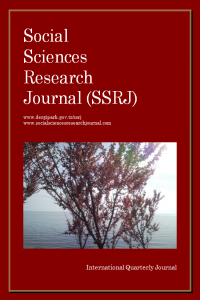Hashtag Savaşları, Çevrimiçi Siyasi Kutuplaşma ve Yerel Seçimler
Sosyal Medya, Fragmantasyon, Yankı Odası, Polarizasyon, Seçimler
Hashtag Wars, Online Political Polarization and Mayoral Elections
Social Media, Fragmentation, Echo Chamber, Polarization, Elections,
___
- Adamic, L. A., & Glance, N. (2005). The political blogosphere and the 2004 U.S. election: Divided they blog. In: LinkKDD '05: Proceedings of the 3rd International Workshop on Link Discovery (ACM, New York), 36–43.
- Aragon, P., Kappler, K., Kaltenbrunner, A., Laniado, D., & Volkovich, Y. (2013). Communication dynamics in twitter during political campaigns: The case of the 2011 Spanish national election. Policy & Internet, 5(2), 183-206.
- Barbera, P. (2014). How social media reduces mass political polarization. Evidence from Germany, Spain, and the U.S. Working paper. Available at citeseerx.ist.psu.edu/viewdoc/summary?doi=10.1.1.658.5476. Accessed February 20, 2020.
- Bulut, E., Yörük, E. (2017). Mediatized populisms - Digital populism: Trolls and political polarization of Twitter in Turkey. International Journal of Communication 11, 4093–4117.
- Chrona, S,. & Bee, C. (2017). Right to public space and right to democracy: The role of social media in Gezi Park. Research and Policy on Turkey 2(1), 49–61.
- Dahlberg, L. (2007). Rethinking the fragmentation of the cyberpublic: From consensus to contestation. New Media & Society 9(5), 827-847.
- Demirhan, K. (2014). Social Media Effects on the Gezi Park Movement in Turkey: Politics Under Hashtags. In: Patrut B, Patrut M. (eds) Social Media in Politics. Public Administration and Information Technology, vol 13. Springer, Cham.
- DiMaggio, P., Evans, J., & Bryson, B. (1996). Have American's Social Attitudes Become More Polarized?. American Journal of Sociology, 102 (3), 690–755.
- Esen, B., & Gumuscu, S. (2019). Killing Competitive Authoritarianism Softly: The 2019 Local Elections in Turkey, South European Society and Politics, 24(3), 317-342.
- Feller, A., Kuhnert, M., Sprenger, T. O., & Welpe, I. M. (2011). Divided They Tweet: The Network Structure of Political Microbloggers and Discussion Topics. International Conference on Weblogs and Social Media (ICWSM), July 17–21, Barcelona, Spain.
- Freelon, D., McIlwain, C. D., & Clark, M. D. (2016). Beyond the hashtags: #Ferguson, #Blacklivesmatter, and the online struggle for offline justice. Center for Media and Social Impact, American University. Available at https://papers.ssrn.com/sol3/papers.cfm?abstract_id=2747066 .
- Garcia, D., Abisheva, A., Schweighofer, S., Serdult, U., & Schweitzer, F. (2015). Ideological and temporal components of network polarization in online political participatory media. Policy & Internet, 7(1), 46-79.
- Grover, P., Kar A. K., Dwivedi Yogesh, K., & Janssen, M. (2019). Polarization and acculturation in US Election 2016 outcomes - Can Twitter analytics predict changes in voting preferences. Technological Forecasting and Social Change, 145(C), 438-460.
- Gruzd, A., & Roy, J. (2014). Investigating political polarization on Twitter: A Canadian perspective. Policy & Internet, 6(1), 28-45.
- Haciyakupoglu, G., & Zhang, W. (2015) . Social media and trust during the Gezi protests in Turkey. Journal of Computer-Mediated Communication 20(4), 450-466.
- Himelboim, I., McCreery, S., & Smith, M. (2013). Birds of a feather tweet together: Integrating network and content analyses to examine cross-ideology exposure on Twitter. Journal of Computer-Mediated Communication, 18(2), 40-60.
- Hong, S., & Kim, S. H. (2016). Political polarization on twitter: Implications for the use of social media in digital governments. Government Information Quarterly, 33(4), 777-782.
- Hong, S., Choi, H., & Kim, T. K. (2019). Why Do Politicians Tweet? Extremists, Underdogs, and Opposing Parties as Political Tweeters. Policy & Internet, 11(3), 305-323.
- Lai, M., Bosco, C., Patti, V., & Virone, D. (2015). Debate on political reforms in Twitter: A hashtag-driven analysis of political polarization. In Data Science and Advanced Analytics (DSAA), (pp. 1-9). IEEE.https://ieeexplore.ieee.org/abstract/document/7344884 .
- Lewis, B. D. (2020). How do mayors get elected? The causal effects of pre-electoral coalitions on mayoral election outcomes in Indonesia. Local Government Studies, 46 (3), 394-413.
- McCoy, J., Rahman, T., & Somer, M. (2018). Polarization and the global crisis of democracy: common patterns, dynamics, and pernicious consequences for democratic polities. American Behavioral Scientist, 62(1), 16–42.
- Ogan, C., & Varol, O. (2017). What is gained and what is left to be done when content analysis is added to network analysis in the study of a social movement: Twitter use during Gezi Park. Information, Communication & Society 20(8), 1220-1238.
- Papacharissi, Z. (2002) The virtual sphere: The Internet as a public sphere. New Media & Society 4(1), 927.
- Ribeiro, M. H., Calais, P. H., Almeida, V. A., & Meira, Jr. W. (2017) . Everything I disagree with is #FakeNews”: Correlating political polarization and spread of misinformation. arXiv:1706.05924, 2017.
- Reuter, O. J., Buckley, N., Shubenkova, A., & Garifullina, G. (2016). Local Elections in Authoritarian Regimes: An Elite-Based Theory with Evidence From Russian Mayoral Elections. Comparative Political Studies, 49(5), 662-697.
- Sabah. (2019). ‘Liderler yerel seçim için yoğun mesai harcadı’ [Leaders engaged in a packed schedule], 28 March. Available at: https://www.sabah.com.tr/gundem/2019/03/29/liderler-yerel-secim-icin-yogun-mesai-harcadi
- Spohr, D. (2017). Fake news and ideological polarization: Filter bubbles and selective exposure on social media. Business Information Review, 34(3), 150–160.
- Sunstein, C. R. (2017). #Republic: Divided democracy in the age of social media. Princeton, NJ: Princeton University Press.
- Tweepy Library for Pyhton (2010) Available at: http://www.tweepy.org
- Weber, I., Garimella, V. R. K., & Teka, A. (2013). Political hashtag trends. In: Serdyukov P. et al. (eds) Advances in Information Retrieval. ECIR 2013. Lecture Notes in Computer Science, vol. 7814. Springer, Berlin, Heidelberg.
- Yardi, S., & Boyd, D. (2010). Dynamic debates: An analysis of group polarization over time on Twitter. Bulletin of Science, Technology & Society, 30(5), 316-327.
- Yayın Aralığı: Yılda 4 Sayı
- Yayıncı: Denta Florya ADSM Limited Company
Örgütsel Adalet ve Örgütsel Bağlılık Üzerine Bir Araştırma
İnsan Kaynaklarında Personel Seçim Problemlerine Promethee Yöntemi ile Çözüm Yaklaşımı
İklim Değişikliğinin Bilimsel Temelleri
Batı Dünyasında Yapılan İlk Kur’an-ı Kerim Çevirileri
Türkiye’den Almanya’ya İşçi Göçünün, 1960 Sonrası Türk Sinemasına Yansımaları
Ahmet ÜSTÜN, Hümeyra Zeynep BAHÇİVAN
Uluslararası Hukukta İnsani Müdahale Kavramı: Balkanlar Örneği
Hashtag Savaşları, Çevrimiçi Siyasi Kutuplaşma ve Yerel Seçimler
